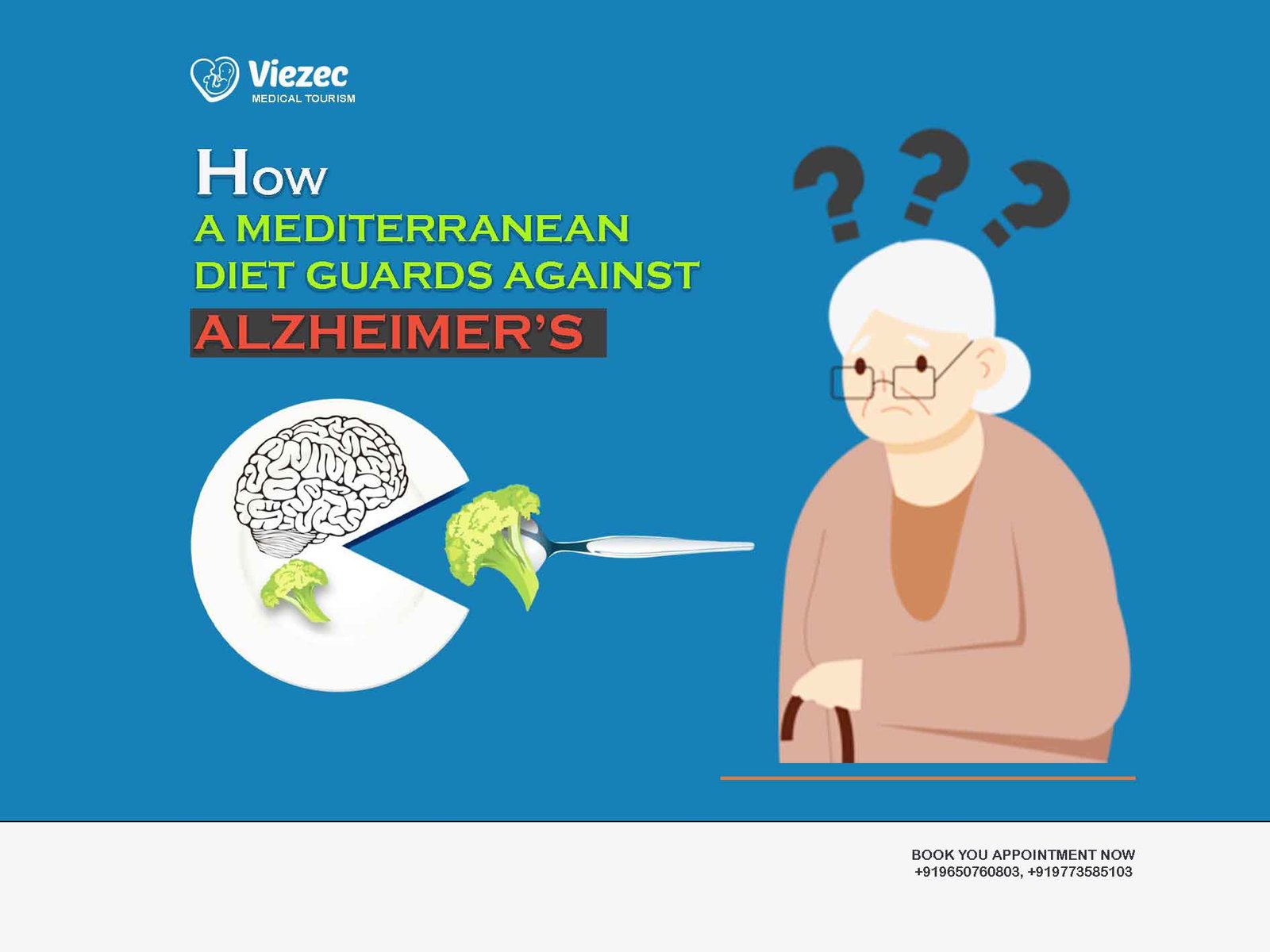Alzheimer’s disease, a devastating neurodegenerative condition, poses a significant health challenge worldwide. Characterized by progressive cognitive decline and memory loss, it not only affects individuals but also places a heavy burden on caregivers and healthcare systems. While research into its causes and potential treatments continues, one promising avenue gaining attention is the role of diet in Alzheimer’s prevention and management. Among various dietary patterns, the Mediterranean diet stands out for its potential to safeguard against Alzheimer’s disease. In this comprehensive exploration, we delve into the mechanisms behind this protective effect and examine the scientific evidence supporting the connection between the Mediterranean diet and Alzheimer’s disease prevention.
Understanding Alzheimer’s Disease
Before delving into the specifics of how the Mediterranean diet influences Alzheimer’s disease, it is essential to grasp the fundamentals of this debilitating condition. Alzheimer’s disease is the most common form of dementia, a group of disorders characterized by a decline in cognitive function severe enough to interfere with daily life. The disease is marked by the accumulation of abnormal protein deposits in the brain, including beta-amyloid plaques and tau tangles, which disrupt neuronal communication and lead to neuronal death. As a result, individuals with Alzheimer’s experience memory loss, impaired reasoning, and changes in behavior and personality.
Despite decades of research, the exact cause of Alzheimer’s disease remains elusive. However, scientists believe it arises from a complex interplay of genetic, environmental, and lifestyle factors. While age is the most significant risk factor for Alzheimer’s disease, lifestyle choices, including diet, exercise, and cognitive activity, also play crucial roles in modulating risk.
Mediterranean Diet: A Nutritional Approach to Brain Health
The Mediterranean diet is renowned for its numerous health benefits, ranging from cardiovascular protection to cancer prevention. Rooted in the traditional dietary patterns of countries bordering the Mediterranean Sea, such as Greece, Italy, and Spain, this dietary regimen emphasizes whole, minimally processed foods rich in fruits, vegetables, whole grains, legumes, nuts, seeds, and olive oil. Fish and poultry are preferred over red meat, and dairy consumption, primarily in the form of cheese and yogurt, is moderate. Additionally, the Mediterranean diet encourages regular but moderate consumption of red wine, particularly during meals.
Central to the Mediterranean diet’s health-promoting properties are its abundance of bioactive compounds, including antioxidants, anti-inflammatory agents, and polyphenols. These compounds exert protective effects throughout the body, combating oxidative stress, inflammation, and cellular damage. Notably, emerging evidence suggests that the Mediterranean diet’s nutrient-rich profile may confer significant benefits for brain health, including a reduced risk of Alzheimer’s disease.
Protective Effects of the Mediterranean Diet Against Alzheimer’s Disease
Anti-inflammatory Properties
Chronic inflammation is increasingly recognized as a key contributor to Alzheimer’s disease pathology. The Mediterranean diet’s emphasis on foods rich in anti-inflammatory compounds, such as omega-3 fatty acids, polyphenols, and monounsaturated fats, may help mitigate neuroinflammation and its detrimental effects on brain function. For instance, omega-3 fatty acids found in fatty fish like salmon and mackerel possess potent anti-inflammatory properties, which can counteract the inflammatory processes implicated in Alzheimer’s disease progression.
Antioxidant Activity
Oxidative stress, resulting from an imbalance between free radicals and antioxidant defenses, is another hallmark of Alzheimer’s disease pathology. The Mediterranean diet, abundant in antioxidant-rich foods like fruits, vegetables, and olive oil, provides a substantial reservoir of compounds capable of neutralizing free radicals and reducing oxidative damage to brain cells. Polyphenols, found in high concentrations in foods like berries, grapes, and dark chocolate, have been particularly studied for their neuroprotective effects, including their ability to enhance cognitive function and reduce Alzheimer’s-related brain pathology.
Cardiovascular Benefits
Mounting evidence suggests a strong link between cardiovascular health and brain health, with risk factors for heart disease, such as hypertension, diabetes, and high cholesterol, also increasing the risk of Alzheimer’s disease. The Mediterranean diet’s proven cardiovascular benefits, including lowered blood pressure, improved lipid profiles, and reduced incidence of metabolic syndrome, may indirectly contribute to Alzheimer’s prevention by safeguarding vascular function and cerebral blood flow. By promoting cardiovascular health, the Mediterranean diet helps maintain optimal brain perfusion and oxygenation, crucial for preserving cognitive function and reducing the risk of dementia.
Regulation of Blood Sugar Levels
Dysregulated glucose metabolism is increasingly recognized as a contributing factor to Alzheimer’s disease pathogenesis. The Mediterranean diet’s emphasis on complex carbohydrates, such as whole grains, legumes, and fiber-rich fruits and vegetables, helps stabilize blood sugar levels and reduce insulin resistance, both of which are associated with a lower risk of cognitive decline and Alzheimer’s disease. Moreover, the consumption of healthy fats, particularly monounsaturated fats found in olive oil and nuts, has been shown to improve insulin sensitivity and reduce the risk of developing type 2 diabetes, a known risk factor for Alzheimer’s disease.
5. Preservation of Gut Microbiota
The gut-brain axis, a bidirectional communication network linking the gastrointestinal tract to the central nervous system, plays a critical role in brain health and cognitive function. Emerging research indicates that the Mediterranean diet, rich in fiber and prebiotic foods like fruits, vegetables, and legumes, promotes a diverse and balanced gut microbiota, which in turn influences brain function and may reduce the risk of Alzheimer’s disease. A healthy gut microbiome produces beneficial metabolites, including short-chain fatty acids, that exert anti-inflammatory and neuroprotective effects, thereby mitigating neurodegeneration and cognitive decline.
Cognitive Stimulation
In addition to its nutritional components, the Mediterranean diet encompasses social and lifestyle factors that contribute to brain health and cognitive resilience. Regular social engagement, leisure activities, and intellectual stimulation, all integral components of Mediterranean culture, have been associated with a reduced risk of dementia and Alzheimer’s disease. Furthermore, adherence to the Mediterranean diet is often accompanied by other healthy behaviors, such as regular physical activity and adequate sleep, which further promote cognitive function and overall well-being.
In conclusion, the Mediterranean diet represents a powerful dietary approach to mitigating the risk of Alzheimer’s disease and promoting brain health throughout the lifespan. Its nutrient-rich profile, characterized by an abundance of anti-inflammatory, antioxidant, and neuroprotective compounds, supports optimal brain function and may help prevent or delay the onset of cognitive decline associated with aging. By incorporating the principles of the Mediterranean diet into daily eating habits, individuals can harness the synergistic effects of wholesome foods, social engagement, and healthy lifestyle practices to protect against Alzheimer’s disease and preserve cognitive vitality well into old age. While further research is needed to elucidate the specific mechanisms underlying the diet-brain connection, the existing evidence underscores the importance of dietary patterns in promoting brain health and reducing the global burden of Alzheimer’s disease.
Related post:-
Shaping Tomorrow: Stem Cell Therapeutics for Alzheimer’s Disease











